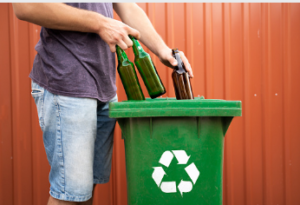All supermarkets, Duane Reade, CVS, Walgreens and Rite Aid, are required to take back bottles and cans. They send them to recyclers like Tomra, who pay stores and redemption centres a nickel for each bottle and can that they return. For more information about the bottle recycling depot location, click here.
 Recycling at Bottle Depots
Recycling at Bottle Depots
Bottle Depots and redemption centres are staffed facilities found in places with container deposit schemes that allow consumers to return empty bottles and cans for a deposit refund. These locations sort and store materials manually or with custom technology like TOMRA’s Expert Line solutions.
Redeeming bottles via container deposit systems puts the money back in consumers’ pockets while minimizing the extraction and depletion of Earth’s natural resources. Recycling glass, aluminium, and plastic bottles requires less energy to manufacture new products.
Gurminder Chilana has built his business, which he started in 2012 near Stewart International Airport in New Windsor, NY, into a successful chain while navigating a sea of state regulations that govern recycling businesses. He and his wife, Preeti, now operate 13 stores in Orange, Sullivan and Ulster counties. Customers drop off their recyclables, dump them on tables and leave with on-the-spot cash — 5 cents per bottle — on top of the 5-cent deposit paid to the distributors who sell the brands.
Helps the Environment
Billions of beverage containers are returned through Return and Earn every year, returning money to the local community. However, the environmental impacts from manufacturing and transporting the bottles have far more significant impact on the environment than their end-of-life. When a bottle is put into a landfill, it will break down to produce methane, contributing to climate change. For more information about the bottle recycling depot location, click here.
Bottle depots help divert millions of bottles from landfills annually by providing a convenient and organized collection point. These facilities also efficiently sort and process returned bottles to ensure they are recycled correctly.
Recycling glass, plastic and aluminium requires less energy than extracting, refining and manufacturing new materials from scratch. For example, five PET plastic bottles can make fabric for a T-shirt, while one aluminium can save enough energy to power a TV for three hours.
A state’s bottle bill directly impacts the amount of material that is recovered, with states with deposit laws having significantly higher recovery rates than those without.
Saves Energy
When a plastic bottle is recycled, it’s turned into something new without the energy-intensive manufacturing process needed to make it from virgin materials. Recycling one plastic bottle saves enough energy to power a 60-watt light bulb for six hours.
Glass bottles and jugs also benefit from their recycling, saving energy when reused rather than having to be made from new materials. Unlike aluminium, glass doesn’t degrade each time it’s recycled.
The sorted containers are then sold to manufacturers for use in their products. Plastics are recycled into various non-bottle products, including polyester carpet fibre, t-shirts, upholstery and industrial strapping. Bioplastics, made from plant material instead of petroleum, are also beginning to gain traction. They require 65% less energy and fuel to produce than regular PET plastics.
Saves Money
The states/provinces/countries with bottle deposit programs also tend to have higher recycling rates than those without it. It is because a cash value is placed on each container, encouraging consumers to return them instead of littering streets and public outdoor spaces.
In addition, a lot of these containers can be reused. For example, a single plastic bottle can be recycled into a fleece jacket or a t-shirt. Recycling aluminium cans saves the energy used to melt them down and produce new ones. It is much cheaper than landfilling and incineration. Moreover, it is better for the environment than using fossil fuels to create new products.
Recycling glass, metal and plastic at bottle recycling plants is important because it conserves natural resources that would otherwise be required to extract and manufacture raw materials for brand-new items. Additionally, recycling these items requires significantly less energy than producing them from virgin materials. For example, recycling one glass bottle saves enough energy to power a computer for two hours or keep a light bulb lit for four hours. It helps to mitigate climate change.
